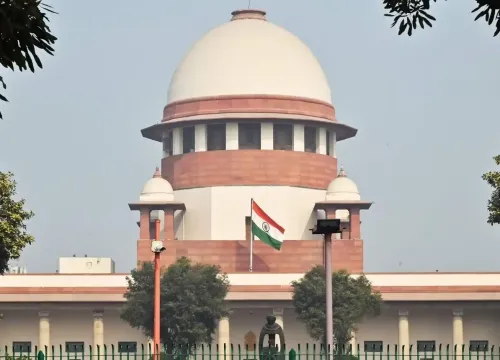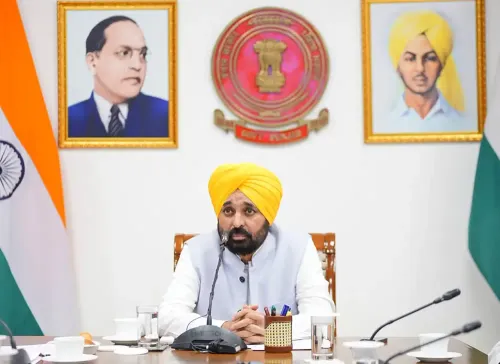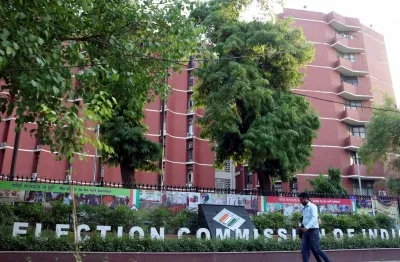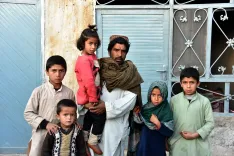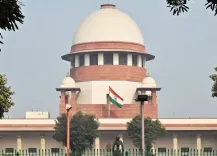Has the Alliance Between BNP and Jamaat Turned Hostile as Bangladesh's Elections Approach?

Synopsis
Key Takeaways
- BNP and Jamaat have severed their long-standing alliance.
- Upcoming elections could reshape the political landscape.
- Khaleda Zia remains a pivotal figure despite health challenges.
- Jamaat’s resurgence poses a threat to BNP’s position.
- International scrutiny is focused on the electoral process and its fairness.
New Delhi, Nov 3 (NationPress) The escalating conflict between the Bangladesh Nationalist Party (BNP) and its former ally, Jamaat-e-Islami, is viewed as a maneuver by their leaders to seize total power in the absence of their mutual adversary – the deposed Prime Minister Sheikh Hasina and her Awami League (AL) party.
The interim government of Bangladesh, under the leadership of Muhammad Yunus, has committed to holding national elections in February of the coming year.
During her nearly two-decade-long premiership, Hasina has been accused of coercing political opponents into compliance.
Ironically, she and her party are now excluded from the electoral process, managed predominantly by her adversaries who label her governance as dictatorial, oligarchic, and guilty of crimes against humanity. This includes the incarceration of former Prime Minister and BNP leader Khaleda Zia, among others.
Zia, imprisoned for seven years, was serving a 17-year sentence for corruption. Following Hasina's departure, Bangladesh's President Mohammed Shahabuddin ordered her release last year. At 80, Zia is in frail health and often hospitalized.
Major opposition factions had united to confront Sheikh Hasina during her rule. The 78-year-old leader of AL is currently residing in exile in India.
Within Bangladesh's present political landscape, parties seek power independently, having severed ties with former allies who once stood united against a common foe.
In the aftermath of last year's July-August student movement and the fall of the AL, past allies find themselves in an increasingly contentious relationship. The BNP and Jamaat concluded over two decades of electoral partnership in 2022, as their alliance against Hasina unraveled.
Some reports suggest that as Jamaat strengthens its position within Bangladesh's electoral arena, the BNP perceives it as a threat to their resurgence under Zia.
For Jamaat, this is a pivotal moment to reclaim religious dominance after enduring a backlash due to its radicalism. BNP leaders are reportedly concerned about Jamaat's increasing influence since the interim government lifted its ban last August.
Under the AL, Jamaat was officially deregistered in 2013 and designated a terrorist organization on August 1, 2024.
Particularly alarming is Jamaat’s student wing's performance in September, which triumphed in the Dhaka University students' union elections. This marked the first victory for an Islamist student faction since Bangladesh's independence 54 years ago.
In response, the BNP's student organization dismissed the election as a “farce,” claiming it was conducted under “deliberate manipulation.”
This has led to an exchange of accusations regarding nationalism and exploiting the interim government.
Both primary factions have been joined in political conflict by other groups, including entities that registered as political parties after the previous year’s student-led movement that resulted in Hasina’s ousting.
Several student leaders have alleged that the BNP and Jamaat have benefited from the current administration while criticizing youth advisors within the interim government.
Earlier this year, leaks about a meeting between senior officials from the BNP and Jamaat in London sparked speculation about a potential understanding between the two due to their shared doubts and criticisms of the Yunus-led administration.
Although the specifics of the meeting remained unclear, the leaders referred to it as a “courtesy call.”
However, media reports deemed it “unrealistic to dismiss political discussions” among the top leaders of these two major parties.
Some analysts viewed this gathering as a result of the leaders’ concerns over the interim government’s operations and its intentions regarding the elections, while others interpreted it as a possible resurgence of Hasina amidst political instability. Amidst this political maneuvering, both regional and global observers are closely monitoring the evolving situation in Bangladesh.



